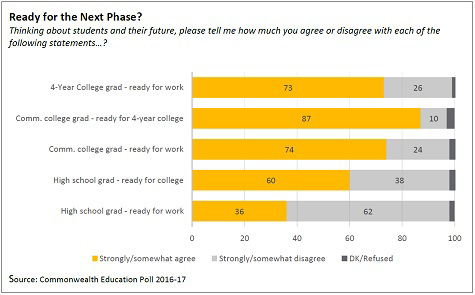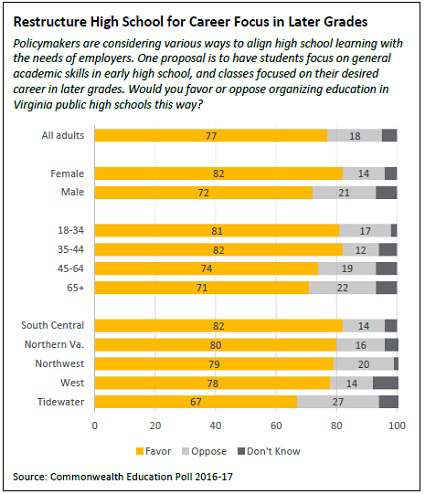 |
Recent State and Local Education News
|
Where do Virginia’s Democratic gubernatorial candidates stand on school choice and other education issues?
The Washington Post
June 12, 2017
Governors have a great deal to say about public education in the states they run, but voters don’t often cast their ballots with education as a prime issue. In Virginia, however, there are plenty of people interested in the education views of the two candidates in Virginia’s Democratic primary for governor — Ralph Northam, the lieutenant governor of the state, and Tom Perriello, a former one-term congressman and diplomat in President Barack Obama’s administration.
On a number of issues, the two have similar if not identical views. Both say they want to:
- focus their education policy efforts on improving traditional local school districts.
- implement state-funded universal prekindergarten programs.
- raise teacher salaries in a state where educators on average make less than the national average.
- improve the Standards of Learning, the state’s standards and series of standardized tests used for accountability purposes. Virginia is one of the handful of states that did not adopt the Common Core State Standards even when the Obama administration was dangling federal funds to persuade state authorities to do so.
Dietra Trent column: President Trump's education cuts will cripple the commonwealth
Richmond Times Dispatch
June 11, 2017
Here in Virginia, our public schools and students are consistently ranked among the best in the nation. We have built on that record of accomplishment by working closely with our federal, state and local partners.
By aligning our education pipeline with the New Virginia Economy, we have helped lay the groundwork for more young people to succeed.
In 2016, Governor McAuliffe secured more than $1 billion for our K-12 and higher education systems.
This historic investment won broad bipartisan support and ensures that the next generation of Virginia students will have the strong, academic foundation they deserve.
It also placed greater emphasis on McAuliffe’s long-term goal of providing disadvantaged students with the resources and support they need to thrive.
As Virginia’s secretary of education, I have seen how good policy and effective deployment of limited resources can transform the lives of children in poverty and empower students to realize their potential.
Department of Education expresses concern about Richmond schools
NBC 12 (WWBT)
June 6, 2017
The Virginia Department of Education says it's concerned with Richmond schools.
The school board asked the state for a division-wide review, in part, because several schools lost their accreditation this year.
The Department of Education sent a team of its staff, as well as several contractors, into Richmond schools for a week. It was studying nearly the entire scope of the school division's functions to determine what Richmond's doing well -- and what it needs to fix.
"We're looking at the accreditation status of a number of schools in Richmond and we've been looking at them as individuals each school separately," said Dr. Steven Staples of the Virginia Department of Education.
NBC 29 (WVIR)
June 12, 2017
The Virginia Department of Education (VDOE) and Virginia Community College System (VCCS) this month honored 15 exemplary career and technical education programs and partnerships. The awards were presented during the annual Creating Excellence Awards Program in Richmond on June 8.
“These honorees are great examples of partnerships that connect K-12 education to community college credentials and real world employers,” State Superintendent of Public Instruction Steven R. Staples said. “Their efforts are preparing the commonwealth’s workforce for the new Virginia economy.”
|
Recent National Education News
|
Who’s helping and who’s hurting? New national study looks at how charter networks measure up, from KIPP to K12
Chalkbeat
June 12, 2017
Some charter school networks are significantly improving student achievement, but others are harming student learning.
That’s the conclusion of the latest study from CREDO, a Stanford-based research group that has released some of the highest-profile research on charter schools.
In the new analysis, they set out to answer key questions that are hotly debated in the charter school world. What types of charters are most effective? Which networks are most successful? And what students benefit most?
|
|
|
Are Virginia high school graduates ready for the next step?
High school graduation season is a wonderful time of celebrating the collective work for a family and the larger community in a student completing twelve years of schooling.
Through late May and early June, thousands of students in Virginia's high schools are hearing their names called and crossing a stage into the next part of life. In light of this, we thought you would find useful the results of the 2016-17 Commonwealth Education Poll in this month's
Poll Spotlight. The results show that members of the public overwhelmingly believe that new high school graduates are college ready, but not workforce ready. We share one of the takeaway graphics here.
This split sense of readiness is part of what motivated education policy-makers to develop a "
Profile of a Virginia Graduate" - a desciption of "the knowledge, skills, experiences and attributes that students must attain to be successful in college and/or the work force and to be “life ready” in an economy and a world characterized by rapid change." (There is also
a video of Dr. Staples, State Superintendent, discussing the development of the profile.) Included in this effort is an adjustment of high school curricula to focus on general skills in early grades and skills specific to a student's envisioned career path in later grades. The 2016-17 poll also provided insight into public opinion on this shift - read below to see whether the public is supportive or not.
If you're interested in some numbers, the 2016-17 graduating class will hope to continue the growth trend in the number of Commonwealth residents completing a high school diploma. In 2015-16 88,848 students received a high school diploma, up from 78,485 a decade ago.
Of the 2015-16 graduates, 49,324 or 45.69 percent of the total graduates or completers received advanced diplomas (which require an additional credit in math, science, social studies and a foreign language) while 35,783 or 39.67 percent received a standard diploma.
On a lighter note, we thought you might enjoy
this blog post from a teacher who asked her/his students to write down what they thought teachers do during the summer. A couple of our favorites:
- Teachers keep track of the days until school starts again because they miss it so much!
- When teachers cannot sleep, they stay up thinking of brain washing techniques and ways to torture their students!
Of course, the reality is different than student's imagine -
this 2015 Atlantic article summarized a number of research findings on whether teachers get a summer break and how that interacts with pay.
Whatever activities you'll be including in your plans, we hope you have a great start to the summer! We look forward to sharing our July newsletter with you which will likely include a run down on the education platforms of the gubenatorial nominees that emerged from yesterday's primary.
Sincerely, CEPI
|
Poll Spotlight - High School Graduates Seen as Ready for College, but Not Workforce.
This year’s poll (conducted in late 2016) gauged public perception on whether graduates of high school are ready to move into the next potential phases of their education or career. The responses suggest that the public generally thinks high school graduates are not ready to join the workforce, but are prepared to go to college.
 |
|
A strong majority (62 percent) think that high school graduates are not prepared for the workplace, strongly or somewhat disagreeing with the statement that “high school graduates are ready for the world of work.” Household income levels mark a difference of opinion on the question. Sixty-seven percent of those with an annual income of $100,000 or more disagreed strongly or somewhat with the suggestion that high school graduates were ready for the workforce. This compared to 55 percent among respondents with incomes below $50,000. Males were also more likely to disagree strongly or somewhat (66 percent) with high school graduates being ready for the workforce than were females (57 percent). Likewise, white respondents were more likely to disagree (65 percent) than were minority respondents (55 percent).
However, most Virginians (60 percent) believe that high school graduates are ready for college, which may indicate that the public thinks a high school education is geared more toward preparing students for college than it is toward preparing them for a specific career. As with their readiness for the workforce, women agreed strongly or somewhat with high school graduates being ready for college more frequently (65 percent) than did men (55 percent). Parents of public school students were also more likely to agree with the statement (at 67 percent) than were those who did not have a student in public schools.
Preparing for a Career in Secondary School
Recent work to develop a profile of Virginia high school graduates has considered whether a restructuring of the high school curriculum is necessary where early high school grades would focus on general skills and later grades would focus on skills needed for a desired career path. For the second year, we asked respondents about such a possible change and found there was continued broad support for such a restructuring of high school. More than three-quarters (77 percent) of respondents supported a transition from focusing on general skills in lower grades to a desired career focus in a student’s final years. This marked a 5 percentage point increase in support from last year.
 |
|
The age and gender of respondents showed differences in the level of support for such a reform, though a majority support it in all categories. Those ages 18-34 (81 percent) and 35-44 (82 percent) were more likely to favor this proposal than those ages 45-64 (74 percent) and those 65 and older (71 percent). Likewise, 82 percent of females supported such a change, compared to 72 percent of males.
There were also significant regional differences in opinion on the idea of restructuring the high school experience. South Central (82 percent in favor), Northern Virginia (80 percent), Northwest (79 percent) and West (78 percent) were tightly clustered together as more likely to be supportive of the idea, in comparison to the Tidewater area, where only 67 percent are in favor.
A copy of the full results of the 2016-17 Commonwealth Education Poll is available at
http://cepi.vcu.edu/publications/polls/.
|
|
